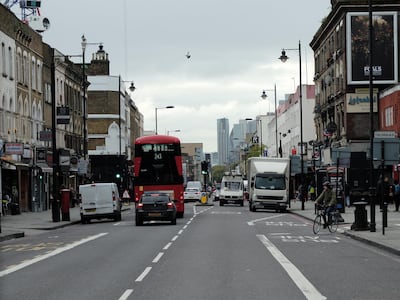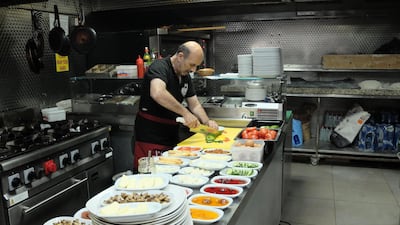Turkish restaurant owners in north London are being squeezed by uncertainty over Britain’s impending departure from the European Union and the political instability that has set up an imminent general election.
A series of missed deadlines for leaving the EU has been blamed for a nationwide slowdown in consumer spending. Britain was supposed to leave on March 29, then Oct 31 but a new deadline of January 31, 2020 was announced this week. A drop in sterling has affected importers even without leaving.
Orders of halloumi, a type of cheese popular in Turkish cuisine but which is sourced almost exclusively from EU member Cyprus, have been especially affected.
Where a weekly order would once cost £45 (Dh 212), the same amount of the cheese now costs £48.
Husein Akkuyu, who voted to remain and helps run London’s Stone Cave restaurant, the impact of Brexit is already being felt.
“It has already started affecting us,” he said.“Most of our vegetables have become more expensive.”
Mr Akkuyu explained his restaurant relies heavily on deliveries of other fresh ingredients from Europe and there has been across the board increases.
“Only our potatoes come from England,” Mr Akkuyu said.
As well as disrupting the supply of ingredients and produce from Europe, Brexit threatens to make staffing restaurants more difficult.
“We are going to be short of staff,” he said, adding that Brexit uncertainty had made the UK a less attractive option to workers from overseas, especially those coming from Europe.
All across North London’s Turkish restaurant scene, businesses are being hit by a Brexit downturn.

Oliver Alpasar, assistant manager the 110-seat Urfa Ocakbasi restaurant in Stoke Newington, said fellow restauranteurs were “depressed” by Britain’s ongoing saga as it attempts to negotiate an exit from the EU.
“The Turkish community in London is mostly known for its restaurants and food businesses,” he explained.
“The first thing to go” in times of uncertainty, he said, is eating out.
“It is seen as something that can be cut down on.”
The first Turkish citizens to arrive in England came in the seventeenth century.
The Turkish population has grown in fits and starts since the 1950s, with new arrivals peaking in the 1970s as thousands of Turkish Cypriots fled the conflict on the Mediterranean island.
Almost 90 per cent of the UK’s Turkish population lives in London, including as many as 400,000 Turkish Cypriots concentrated in areas of north and north-east London including Hackney, Enfield and Haringey.
Despite the negative impact on trade -- planning documents given to parliament in September said a no-deal scenario would severely disrupt food imports from Europe – the Turkish community sits on both sides of the debate.
“To be honest with you, I voted for Brexit,” said Hakan Sefteli, manager at Derran restaurant.
“I think it will be good for the country in the long run,” he said.
Mr Sefteli argued that Turkish restaurants were already under pressure from increased competition and the changing eating habits of Londoners.
“People follow trends and people are trying new things,” he explained, adding that the rise of vegetarianism and veganism had hit business.
The 26-year-old restaurateur was bullish about the rising costs of ingredients.
“If prices go up, we’ll just put ours up,” he said.
“Just because a meal might cost 50p more, you’re not going to go home and cook, are you?”
For Mr Sefteli, despite Brexit disruption, London remains an attractive place to do business.
“If your business is bad in London, then you should try something else.”


